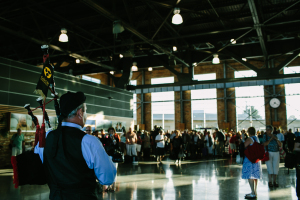
If you wear a kilt and play the bagpipes for thousands of visitors from around the English speaking world, you can expect to be on the receiving end of a lot of questions about Scotland’s drive for independence. As the bagpiper for the Rocky Mountaineer train, I certainly have.
To be clear, I was born and raised in New Scotland (Nova Scotia) not Old Scotland. I am a fifth generation Canadian and obviously unable to vote. However, as a kilt-wearing bagpiper with a Scottish name, believe me, you become a magnet for questions from visitors from around the world about Scottish independence.
As I write, the decision has been made. Scotland will remain as part of the United Kingdom. However, if I was permitted to vote on September 18, I would have voted Yes, along with 45% of the Scottish population. It’s an old grudge, but here’s why.
More than 300 years ago, the Scottish and English parliaments were forcefully united under the Act of Union. For years afterwards, the Scots (Jacobites) agitated against the English rule, promoting their own (Prince Charles Stuart, grandson of James VII of Scotland and II of England) as their rightful king over England and Scotland. Charles Stuart united the normally warring Scottish clans, marched into England and came within 125 miles of London. However, the English rallied under William, Duke of Cumberland, driving back the Scots and eventually  meeting for a final mortal battle in April, 1745 at Culloden Moor. The English won – decisively.

The following is an excerpt from The National Trust of Scotland and describes the battle’s aftermath:
“Within a few days of the battle, around 1,500 Jacobite soldiers gathered at Ruthven Barracks, ready to continue the campaign. To their surprise Charles gave the order to disperse and then went into hiding. For him, the Rising was over.
Unopposed, the government sent its army and navy across Scotland, punishing anyone suspected of Jacobite sympathies. The policy of ‘pacification’ of the Highlands had begun.
The government began to dismantle the structures of Highland society. Chiefs were deprived of their legal powers and clansmen of their weapons. Jacobite estates were seized by the Crown. The kilt and tartan were banned.”
As Jacobite estates and lands were seized, the Clansmen who had lived in their ancient territory for hundred’s of years were mercilessly ordered off and replaced with more lucrative four legged, shaggy animals – sheep. Those who were left behind on ancestral land were ruled over by absentee English landlords. (It should be noted that the Clearances of the Highland was perpetrated by many clan chieftains and their henchmen, at the behest of the English, including the 24th & 25th chief of the Chisholm Clan) The Chisholm Clan was one of the many Highland tribes forced off their traditional land in Strathglass, herded down to Fort William and onto boats for the New World. Our devastated ancestors huddled on these decrepit sailing vessels with their families, their few belongings and their bagpipes, heading into an uncertain land and future; their lives

destroyed by the English. For weeks, they inched across the turbulent North Atlantic Ocean to a wilderness of trees and emptiness where they hoped to start life anew – in their New Scotland (Nova Scotia).  Today, the ancestors of those desperate pioneers still populate North-eastern Nova Scotia, along with the Grant, MacDonald and Fraser Clans who settled in Antigonish and Inverness County, Cape Breton. Almost 200 years later, our language continues to be spoken, our pipes played and our culture maintained.
We are here because of the English.
Given the chance, few of us would venture back to Scotland. We are Canadians with a life in the New World where we have prospered with our own land and industries, our own

universities and 200 years of success. We are proud to be both Canadians and Nova Scotia Scots. Our Highland culture is strong, but our (weakening) link is with Scotland, not England. To me, a wrong was committed by the English many years ago. And while time has healed the wound to our ancestors, it has not been forgotten. The Scots have a vibrant and living culture that is unique in the world, bolstered by an industrious, educated and enlightened people who have helped to shape our modern world. I believe, like 45% of voting Scots, that an independent Scotland is the future. Maybe someday when the time is right, their wish will finally come true